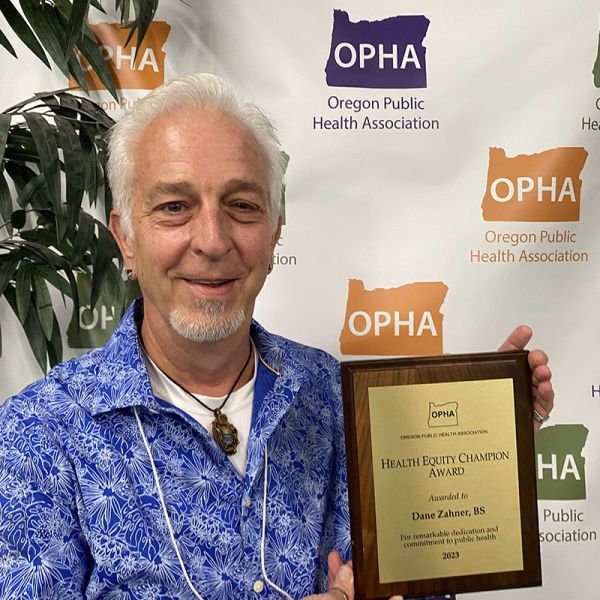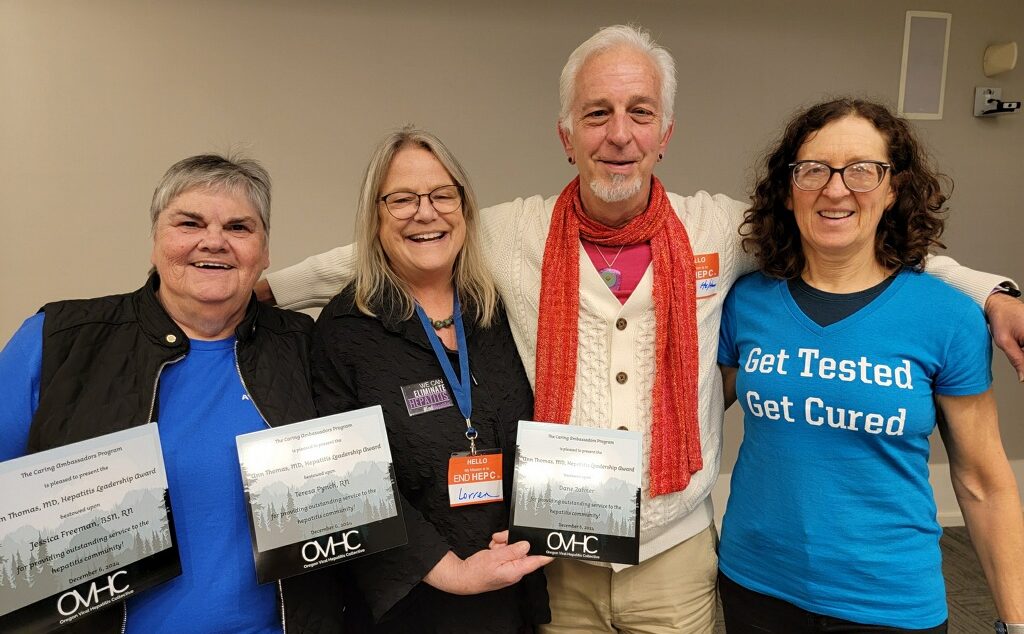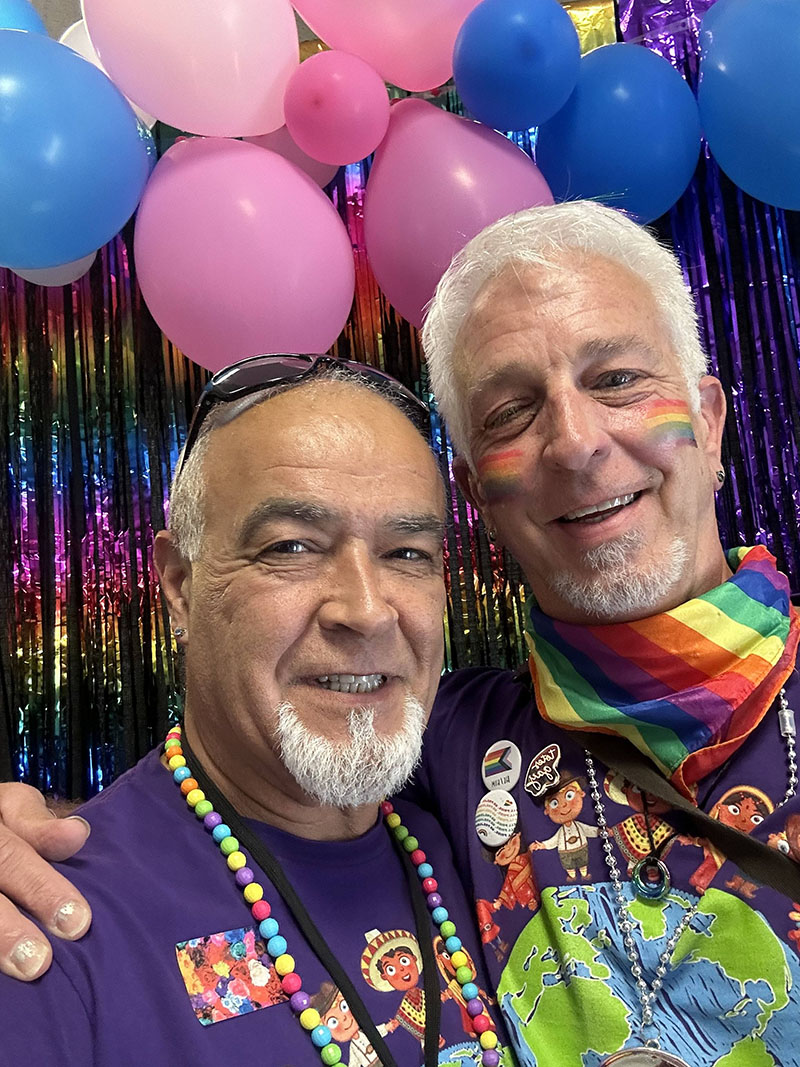
Building Bridges: Delta Sig Alumnus Leads Harm Reduction Efforts in Southern Oregon
Written by
Elizabeth Allouche
Published on
June 24, 2025
Updated on
August 13, 2025
Dane Zahner, Central Michigan ’86, is passionate about serving his community. He’s the kind of guy who gets up for a 7 a.m. interview because he’s so excited to talk about the importance of harm reduction work. He’s humble. He’s kind. And he’s the definition of an understated leader whose journey reflects the lifelong impact of Delta Sigma Phi — striving to be the best leadership fraternity for men committed to service, inclusion, and leadership development.

As Southern Oregon Prevention Manager for HIV Alliance, Dane leads a team working to prevent new HIV infections, support those living with HIV, and reduce the harm caused by addiction and injection drug use. His work has earned him both the Health Equity Champion Award from the Oregon Public Health Association and the Ann Thomas Leadership Award for his impact across the state. But Dane would be the first to say the real accomplishment is helping individuals take their next step toward stability.
“My piece is prevention,” Dane said. “Protect people, keep them alive until they’re ready to change. It’s powerful.”
The work of HIV Alliance reaches 15 counties in rural Oregon, providing case management to over 1,200 clients. Services include HIV and hepatitis C testing, syringe exchange, overdose prevention through naloxone distribution, and peer support programs. “We’re focused on getting people care, housing, medical access. We just meet people where they’re at,” Dane explained. “And if there’s a need or a want to change, we’re going to support that.”
That “meeting people where they are” philosophy shapes everything HIV Alliance does, especially as fentanyl and other highly addictive synthetic opioids have changed the landscape. “Fentanyl changed the game for us,” Dane said. “In the eight years I’ve been doing this, it has just taken over. And it’s so dangerous. These drugs are not what they used to be. People are dying because what they’re using isn’t what they think it is.”
The statistics back up the urgency of his work. According to the Oregon Health Authority, Oregon ranks third in hepatitis C deaths, with injection drug use as a primary risk factor. In Dane’s region, about one in four people tested show positive results for hepatitis C. “The scary part is we’re seeing new HIV infections higher than the state average right here where we live,” he said.
Serving rural communities adds another layer of complexity. “Some of these counties are so rural, you’re 30 miles from the nearest pharmacy. Not everyone has a car or a phone or even internet. We have drop boxes at fire departments where people can safely dispose of syringes. We’ve collected close to 600,000 syringes. That’s 600,000 potential exposures we’ve helped avoid.”
Alongside the challenges of addiction, Dane also emphasizes the importance of serving LGBTQ+ clients, especially those in the trans community. “There’s a real gap in healthcare for trans individuals in rural America,” he said. “The stigma they face is huge, and many don’t feel safe or welcome seeking care through traditional providers. Our work isn’t just about preventing HIV or overdose — it’s about creating safe, affirming spaces where people can access the care they need without judgment. That’s life-saving work too.”
 While many people might shy away from this kind of work, Dane has made harm reduction his life’s mission. But this second career came after 30 years in retail management. “I managed Kmart stores. And even then, I tried to make my store the store of the neighborhood,” he said. “We did Shop with a Cop, Christmas for Kids, anything to support the community. I always had a staff that wanted to give back.”
While many people might shy away from this kind of work, Dane has made harm reduction his life’s mission. But this second career came after 30 years in retail management. “I managed Kmart stores. And even then, I tried to make my store the store of the neighborhood,” he said. “We did Shop with a Cop, Christmas for Kids, anything to support the community. I always had a staff that wanted to give back.”
That desire to give back started years earlier, as an undergraduate in Delta Sigma Phi. “It was a really down-to-earth group. The Fraternity gave me leadership skills, and we were involved in things that went beyond just social life. Financial management, leadership positions, networking, interfraternity council work. All those experiences planted seeds for how I serve the community now.”
What makes Dane’s story even more powerful is how closely his work parallels his own personal journey of acceptance and recovery.
“I was in the closet until I was 32,” he said. “It was a different time then. But when I finally came out, my Fraternity brothers were nothing but supportive. I went back for my reunion, we reconnected, and it’s never been an issue.” He speaks openly now about his identity not only as a gay man, but as a recovering alcoholic. “Addiction was the most challenging part of my addiction,” he said. “Little baby steps forward. That’s what people do, and that’s what we’re here to support.”
The connection between his own experience with addiction and his professional work is clear. “I think it gives me perspective when I work with people who are struggling. I’ve been there. Recovery is not a straight line. Sometimes you just need someone to meet you where you are, offer you that next safe step, and stay with you while you figure out what’s next.”

Dane has also become a visible leader for LGBTQ+ individuals in Southern Oregon’s conservative rural communities. “I think you have to build bridges, not walls. I’m often the only gay man in the room. But when people know who I am and see the work I do for the community, it starts to change minds. We’re all just people trying to help our communities.”
Even in small ways, Dane sees how representation makes a difference. “My picture goes up on Zoom calls, and it’s me and my husband. That’s who I am. And by being present, by being involved, I hope I make it a little easier for the next person.”
Despite the heavy challenges he faces, Dane remains hopeful — and encourages younger generations to stay open to wherever their journey takes them. “Just be open to different opportunities. Look at your passions and go with them. I never thought I would end up here after retail. But volunteering, being on the board at HIV Alliance, opened this door for me. Sometimes change is scary, but it can also be the thing that lets you do what you were meant to do.”
In the end, Dane’s work is about helping people survive long enough to write their own next chapter.
“You can build a better world just by being who you are,” he said. “Sometimes, you just need to be there for someone, so they know it’s possible.”